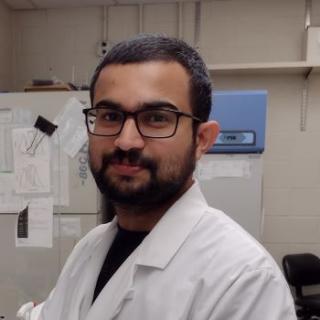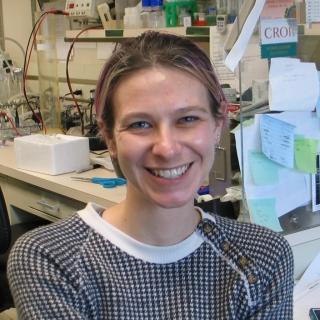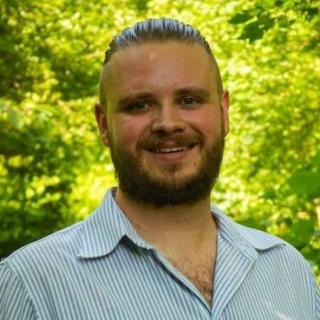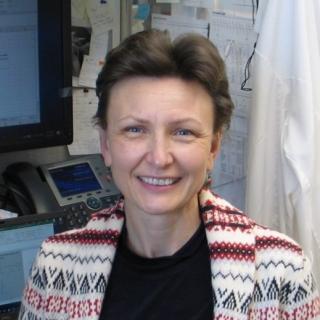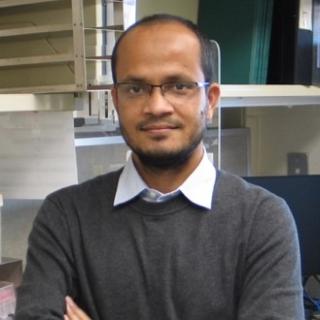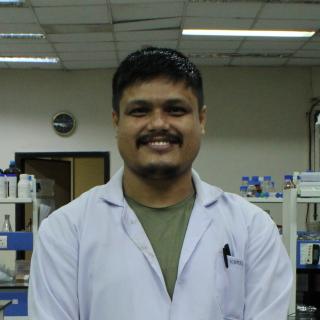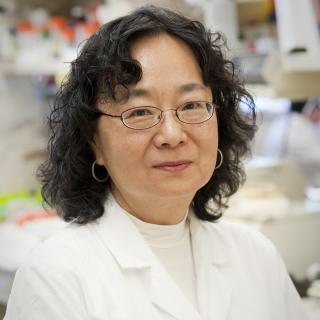
Wei-Shau Hu, Ph.D.
- Center for Cancer Research
- National Cancer Institute
- Building 535, Room 336
- Frederick, MD 21702-1201
- 301-846-1250
- wei-shau.hu@nih.gov
RESEARCH SUMMARY
Dr. Hu is widely recognized as a key authority on retroviral recombination, RNA packaging, and virus assembly. Her innovations in combining advanced molecular biology and biochemical approaches with state-of-the-art microscopy techniques have led to significant advancements in HIV molecular virology research. Under Dr. Hu’s direction, the Viral Recombination Section investigates multiple aspects of the retroviral life cycle that affect the transfer of viral genetic information. These studies have profound implications for questions that are fundamentally important to HIV replication, which can be used to generate new strategies to block the spread of HIV. Dr. Hu was appointed as HIV DRP Deputy Director of Basic Research in 2021.
Areas of Expertise

Wei-Shau Hu, Ph.D.
Research
HIV Gene Expression, RNA Packaging, Virus Assembly, and Replication
We study how HIV generates infectious viruses and retroviruses transfers genetic information to the next generation. HIV-1 provirus utilizes host machinery to express its genes. During virus assembly, HIV-1 packages two copies of full-length viral RNA into a particle. Upon infecting a new host cell, virion RNA is used as the template to generate viral DNA, which integrates into the host chromosome to form a provirus. We study several aspects of the viral replication cycles that affect the transfer of viral genetic information, including the regulation of transcription start site usage, transport and trafficking of the viral RNA, structures and functions of viral RNA that affect gene expression, packaging of the viral RNA genome, virus assembly, and reverse transcription. We use molecular biology and biochemical approaches in combination with state-of-the-art microscopy techniques to study these topics.
HIV transcription start site usage and RNA functions. HIV-1 uses multiple transcription start sites to generate several unspliced RNA species with a few nucleotides difference at the 5' end. Despite being 99.9% identical, these RNA species differ functionally. For example, the RNA species containing one guanosine at the 5' end (1G RNA) is selected over RNA with three guanosines at the 5' end (3G RNA) to be packaged into virion as viral genome. Our studies showed that 1G and 3G RNA tend to fold into different conformations with 1G RNA structures that are less likely to interact with Gag. We have also showed that the expression of both 3G and 1G RNA are important for HIV-1 replication fitness. Mutants that express predominantly 3G (without 1G) or 1G (without 3G) have defects in replication fitness. We are currently examining how HIV-1 regulates transcription start site usage to diversify its unspliced RNA species and fulfill distinct functions.
Retroviral RNA packaging and virus assembly. In order to generate infectious viruses, HIV-1 must encapsidate full-length unspliced RNAs into its particle. To study HIV-1 RNA packaging, we have developed a novel assay to directly visualize viral RNA in the particles at single-RNA-molecule sensitivity. This assay reveals that most HIV-1 particles contain two copies of full-length viral RNA; furthermore, RNA packaging is regulated by the recognition of one dimer (two RNA molecules). Using live-cell imaging tracking individuals RNAs, we have shown that HIV-1 RNA dimerizes on the plasma membrane, the major virus assembly site, and Gag-binding stabilizes RNA dimer. We have also showed that the packaging of HIV-1 RNA can promote particle assembly. We are currently using genetic, biochemical, and imaging approaches to study the interactions between viral Gag protein and full-length RNA that lead to the encapsidation of the viral genome during virus assembly.
Retroviral RNA trafficking. Full-length HIV-1 RNA needs to traffic to specific subcellular locations to carry out its functions, including serving as a template for Gag/Gag-Pol translation and as a genome in the newly assembled virion. The functions of the viral RNA and the translated proteins can be affected when RNA is targeted to incorrect locations in the cells. Using single-RNA tracking live-cell imaging techniques, we have studies the distributions of translating and non-translating RNAs in cells. We are continuing these studies to further define HIV-1 RNA transport and its relation to the function of viral RNAs. These experiments will provide an understanding of aspects of HIV-1 replication that we currently know very little about and will allow us to better understand how HIV-1 uses the cellular machinery to traffic its macromolecules.
Reverse transcription and recombination. Recombination plays an important role in HIV replication and evolution. Many of the primary isolates of HIV are recombinants, and recombination can assort mutations to generate variants that escape host immune responses or are resistant to multi-drug treatment protocols. Additionally we have shown that recombination is required for efficient DNA synthesis during virus replication. HIV-1 recombination occurs during reverse transcription, using information in the two RNAs to produce a hybrid DNA. Therefore, phenotypically different recombinants are generated from viruses containing two copies of different RNAs. Only cells that are doubly infected can produce virions containing two different RNAs. To better understand interactions in HIV-1 populations, we study the dynamics of double infection, the frequency of recombination, and the mechanism of reverse transcription.
Publications
- Bibliography Link
- View Dr. Hu's PubMed Summary
HIV-1 usurps transcription start site heterogeneity of host RNA polymerase II to maximize replication fitness
Selective packaging of HIV-1 RNA genome is guided by the stability of 5' untranslated region polyA stem
Visualizing the translation and packaging of HIV-1 full-length RNA
Recombination is required for efficient HIV-1 replication and the maintenance of viral genome integrity
HIV-1 RNA genome dimerizes on the plasma membrane in the presence of Gag protein
Biography
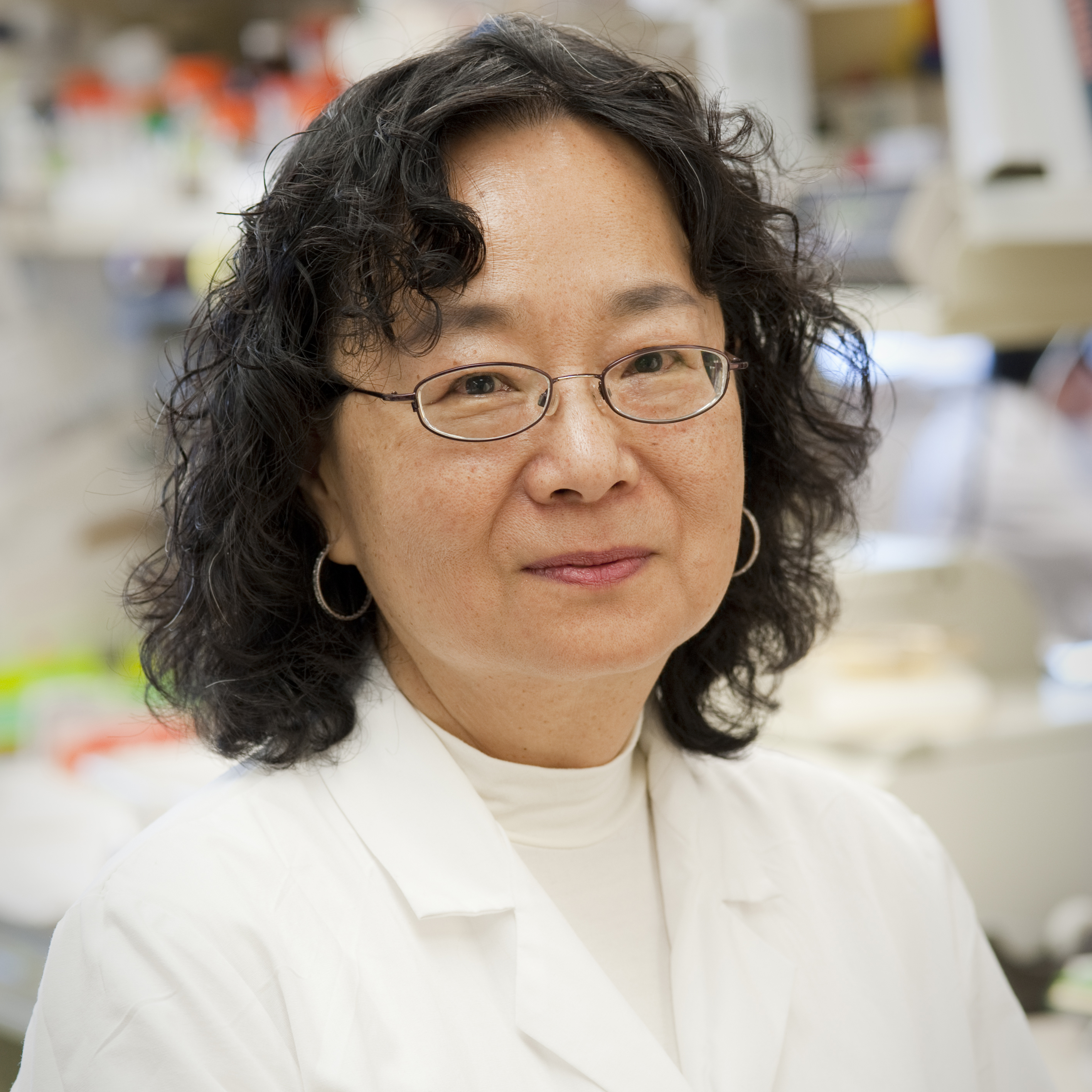
Wei-Shau Hu, Ph.D.
div>Dr. Wei-Shau Hu received her Ph.D. in Genetics from the University of California, Davis, in 1987. She studied the mechanisms of DNA recombination that lead to human α-thalassemia in Dr. James Shen's laboratory. Under Dr. Howard Temin's guidance, she studied the mechanisms of retroviral recombination as a postdoctoral fellow at the University of Wisconsin. In 1991, Dr. Hu joined the faculty of West Virginia University as an Assistant Professor in the Department of Microbiology and Immunobiology and the Mary Babb Randolph Cancer Center. She was promoted to Associate Professor with tenure in 1998. In 1999, she joined the National Cancer Institute (NCI) as Senior Investigator and Head of the Viral Recombination Section in the HIV Drug Resistance Program (HIV DRP, renamed the HIV Dynamics and Replication Program in 2015). Dr. Hu was an organizer of the 2009 Cold Spring Harbor Laboratory Retroviruses Meeting. She served as the Frederick representative of Women Science Advisors for the NCI from 2012 to 2016 and as a member of the AIDS Molecular and Cellular Biology Study Section of the National Institutes of Health extramural grant funding programs from 2010 to 2016. She serves as one of the NCI representatives in the Scientific Interaction Subcommittee of the National Interagency Confederation for Biological Research. She is a member of the NCI RNA Biology Initiative Steering Committee, and a member of the NCI Promotion Review Panel. She is the recipient of Research Awards from Office of AIDS Research and a member of the Behavior of HIV Viral Environments (B-HIVE) consortium.
Job Vacancies
We have no open positions in our group at this time, please check back later.
To see all available positions at CCR, take a look at our Careers page. You can also subscribe to receive CCR's latest job and training opportunities in your inbox.
Team
News
NIH Fellows Awards for Research Excellence
Akhil Chameettachal received a 2026 NIH Fellows Award for Research Excellence (FARE) for travel to attend and present his work at a scientific meeting in the U.S. This award, which acknowledges outstanding scientific research performed by intramural postdoctoral fellows, is sponsored by the NIH Fellows Committee, Scientific Directors, and Office of Intramural Training and Education and is funded by the Scientific Directors. FARE awards are based on scientific merit, originality, experimental design, and overall quality and presentation of the abstracts.
Members of the Hu Lab who were FARE awardees in previous years include Alice Duchon and Chijioke Umunnakwe (2020), Jonathan Rawson (2019, 2021), Sheikh Abdul Rahman (2016), Luca Sardo (2015), Kari Dilley (2012), Michael Moore (2009), Mario P.-S. Chin (2006 and 2007), Kazushi Motomura (2007), and Olga Nikolaitchik (2006).
Hu lab at CSHL Retrovirology Meeting 2025
Members of the Hu lab attended the 2025 Cold Spring Harbor Laboratory Retrovirology Meeting.
Olga Nikolaitchik and Akhil Chameettachal gave poster presentations.
Olga Nikolaitchik publishes in J. Virology
Olga Nikolaitchik, Akhil Chameettachal, Saiful Islam, and Zetao Cheng along with members of the Pathak lab publish in J. Virology (2025).
- How to recover from a bad start: adaptation of HIV-1 transcription start site mutations during serial passaging in culture. J. Virol May 7;e0015925.
Zetao Cheng publishes in Viruses
Zetao Cheng, Olga Nikolaitchik, Alice Duchon, and Jonathan Rawson with contributions from Vinay Pathak publish in Viruses showing that elements in the 5' untranslated region of viral RNA important for HIV gag recognition and cross-packaging(2025).
- Elements in the 5' Untranslated Region of Viral RNA Important for HIV Gag Recognition and Cross-Packaging. Viruses. April 10; 17(4):552.
Saiful Islam publishes in mBio
Saiful Islam, Olga Nikolaitchik and Zetao Cheng publish in the journal mBio, showing HIV-1 transcription start sites usage and its impact on unspliced RNA functions in people living with HIV (2024). This work was also done in collaboration with Vinay Pathak, Frank Maldarelli and Robert Gorelick (FNL).
HIV-1 transcription start sites usage and its impact on unspliced RNA functions in people living with HIV. mBio Dec 27:e0357624.
Poster Presentation at the NIH HIV Structural Biology Meeting 2024
Jonathan Kitzrow (post-doc) presented a poster at the 2024 HIV Structural Biology Meeting at NIH-Bethesda. A VideoCast is available here.
Zetao Cheng and Saiful Islam publishes in J Virol
Zetao Cheng, Saiful Islam and Olga Nikolaitchik publish in the journal J Virol, showing translation of HIV-1 unspliced RNA is regulated by 5' untranslated region structure (2024). This work was also done in collaboration with Vinay Pathak and Ohio State University.
- Translation of HIV-1 unspliced RNA is regulated by 5' untranslated region structure. Oct 22;98(10):e0116024.
Hu lab at CSHL Retrovirology Meeting 2024
Members of the Hu lab attended the 2024 Cold Spring Harbor Laboratory Retrovirology Meeting.
Oral presentation was delivered by Saiful Islam (post-doc) and poster presentations were made by Zatao Cheng (post-doc), Alice Duchon (staff scientist), Sarah Harrison (post-bac), Jonathan Kitzrow (post-doc).
Intramural AIDS Research Fellowship Awards
Intramural AIDS Research Fellowship (IARF) awards from the Office of AIDS Research, Office of Intramural Research, and Office of Intramural Research & Training in the National Institutes of Health include full stipend support to successful candidates who demonstrate outstanding scientific potential through both an imaginative and thoughtful research plan and a well thought out career development plan.
Akhil Chameettachel received an IARF Award in 2024 to support his project. Previous winners include: Jonathan Kitzrow (2022), Alice Duchon (2019, 2020) and Jonathan Rawson received an IARF Award in 2017 and 2018 to support his research project on "Understanding the Pseudodiploid Nature of HIV-1."
Wei-Shau Hu delivers a talk at the Conference on Retroviruses and Opportunistic Infections
Wei-Shau delivered her talk “ HIV-1 Transcription Start Site Usage and Its Impact on Unspliced RNA Functions In Vivo" at CROI 2024. This work was done by members of the Hu lab, Saiful Islam, Zetao Cheng, Oliga Nikolaitchik and in collaboration with Vinay Pathak and Frank Maldarelli.
Alice Duchon publishes her review in HIV-1 RNA genome packaging
Alice Duchon publishes her review in mBio summarizing cis- and trans-acting elements critical for HIV-1 RNA packaging, locations of Gag:RNA interactions that mediate genome encapsidation, and the effects of transcription start sites on the structure and packaging of HIV-1 RNA. (2024)
- HIV-1 RNA packaging genome packaging: it's G-rated. mBio. 2024 Feb27:e0086123.
Travel Award, HIV DRP Think Tank Meeting
Zetao Chris Cheng received a travel award for one of the two best presentations by NCI fellows at the 2023 HIV DRP Think Tank Meeting. The $1000 travel award was provided by the HIV DRP, Center for Cancer Research, NCI. Yang Liu received a travel award for one of the two best presentations by NCI fellows at the 2015 HIV DRP Think Tank Meeting. The $1000 travel award was provided by the HIV DRP, Center for Cancer Research, NCI.
Best oral presentation Award, 12th International Retroviral Symposium
Zetao Chris Cheng received the best oral presentation award (for postdocs) at the 12th International Retroviral Symposium in 2023.
Wei-Shau gave a talk at the NIH OAR Innovation in HIV Research Symposium
Wei-Shau gave a talk at the OAR Innovation in HIV Research Symposium on her labs recent PNAS (2023) paper: "HIV-1 usurps transcription start site heterogeneity of host RNA polymerase II to maximize replication fitness".
Wei-Shau Hu receives Champion Award
Wei-Shau Hu and colleagues of the RNA Biology Initiative Group receive the 2022 NCI Director's Champion Award "for creating an environment that facilitates the exchange of information on the biological and therapeutic roles of RNA and supports tenure-track and trainee RNA scientists."
Wei-Shau Hu Appointed as a Deputy Director in HIV Dynamics and Replication Program
In October 2021, Wei-Shau Hu was appointed as HIV DRP Deputy Director of Basic Research.
Wei-Shau Hu Received 2021 Distinguished Research Career Award from The Ohio State University Center for Retrovirus Research
Wei-Shau Hu was selected by the Center for Retrovirus Research (CRR) of The Ohio State University to receive the 2021 Distinguished Research Career Award. This annual award honors the distinguished research career of a scientist working in the field of retrovirology. The retrovirologist is nominated by student and faculty members of the CRR and as part of the award recognition is invited to give a special lecture to all members of The Ohio State University biomedical research community, co-sponsored by the CRR, the Infectious Diseases Institute, the Comprehensive Cancer Center, and the campus-wide Virology Forum. Dr. Hu received the award "in recognition of her substantial body of work contributing to our understanding of retroviral recombination, RNA packaging, and virus assembly." The title of her keynote seminar was “How Does HIV-1 Transfer Genetic Information to Its Progeny?”
Wei-Shau Hu Elected to American Academy of Microbiology
Wei-Shau Hu was elected as a Fellow in the American Society of Microbiology (AAM) in February 2021. The AAM is the honorific leadership group within the American Society for Microbiology, the world’s largest society dedicated to advancing the microbial sciences. AAM Fellows are recognized as distinguished researchers who are "elected through a highly selective, annual, peer review process, based on their records of scientific achievement and original contributions that have advanced microbiology....Each elected Fellow has built an exemplary career in basic and applied research, teaching, clinical and public health, industry or government service."
New Investigator Scholarships, Conference on Retroviruses and Opportunistic Infections
Jonathan Rawson was awarded a New Investigator Scholarship in 2021 to present his research findings in the Conference on Retroviruses and Opportunistic Infections (CROI). CROI scholarship awardees in previous years include Alice Duchon and Jonathan Rawson (2020), Chijioke (CJ) Umunnakwe (2019), Yang Liu (2017), and Luca Sardo (2015).
Alumni
Covers
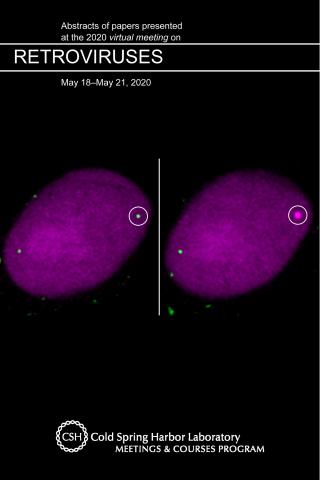
HIV-1 Uncoats in the Nucleus Near Sites of Integration
A recent study published by the research groups of Vinay Pathak and Wei-Shau Hu in Proceedings of the National Academy of Sciences USA (“HIV-1 uncoats in the nucleus near sites of integration,” PNAS 117:5486-5493, 2020) was featured on the front cover of the Cold Spring Harbor Laboratory 2020 Retroviruses Meeting abstract book. Pathak lab member Ryan Burdick launched the meeting with his talk on the study and reported that HIV-1 uncoats in the nucleus near sites of integration. Contrary to the prevailing theory for more than 40 years that retroviral uncoating occurs in the cytoplasm, the study team showed that HIV-1 cores are essentially intact as they enter the nucleus, where they complete reverse transcription before uncoating near their sites of integration into the host genome. These unexpected results fundamentally alter the current understanding of HIV-1 replication, which could lead to the development of more effective strategies and drugs for the treatment of HIV infections.
In the cover image, the left panel shows an HIV-1 capsid localized in the nucleus and the right panel shows a site of transcription of the viral genome at the site where the capsid localized.
To read more about the study, see the original research article and the commentary "Entering and breaking for HIV?" in Nature Reviews Microbiology.
This study was also awarded the 2020 PNAS Cozzarelli Prize in Biomedical Sciences and featured on the website of the Center for Cancer Research, National Cancer Institute (“New study overturns conventional understanding of how HIV infection occurs”).
Burdick RC, Li C, Munshi MH, Rawson, Nagashima K, Hu W-S, Pathak VK. Cold Spring Harbor Laboratory Retroviruses Meeting Abstract Book, May 2020.
